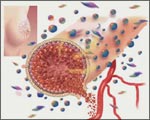
A recent study has revealed that, use of injectable form of progestin for birth control for one year or more doubles the risk of breast cancer in young women.
While the contraceptive, called depo-medroxyprogesterone acetate, or DMPA, contains the similar kind of progestin as the menopausal hormone-therapy found by a Women's Health Initiative clinical trial to raise the risk of breast cancer among postmenopausal women, some studies have found the relation between DMPA use and breast cancer risk in younger women.
"While DMPA is widely used by women throughout the world, there are limited data on the association between DMPA and breast cancer incidence," said Christopher I. Li of Fred Hutchinson Cancer Research Center, who led the study.
"Our study adds to the body of knowledge from international studies conducted in a diverse group of countries - Kenya, New Zealand, Thailand, Mexico and Costa Rica - which have shown that one of the risks associated with DMPA use may be an increased risk of breast cancer," he said.
Li and his Hutchinson Center colleagues found that current use of DMPA within five years for 12 months or longer were related with a 2.2-fold enhanced risk of intrusive breast cancer.
Moreover, the risk disappeared within months after the use of such contraceptive was discontinued.
The researchers also found that women who used the contraceptive for less than a year or who had stopped using it more than a year earlier did not have an increased risk of breast cancer.
"Although breast cancer is rare among young women and the elevated risk of breast cancer associated with DMPA appears to dissipate after discontinuation of use, our findings emphasize the importance of identifying the potential risks associated with specific forms of contraceptives given the number of available alternatives," the authors wrote.
The study was carried on 1,028 Seattle-area women aged in between 20 to 44 who had been suffering from breast cancer. In addition to that, an additional 919 women were studied as a control group without any history of breast cancer for comparison purposes.
Of the total number, about 10 percent were reported to use DMPA, which is consistent with the pattern of usage across the nation, Li said. Use of the injectable contraceptive was about 5 percent higher among non-white women during the study.
"In the United States many women have numerous options for contraception, and so it is important to balance their risks and benefits when making contraceptive choices," Li added.
The details of the study have been published online in Cancer Research.
-With inputs from ANI
|
|
Read More: Kenya | New Zealand | Mexico | Thailand | Health | N.i.area | Ind.area Sarojininagar Po | Khalilabad I.area | Indl.area Nagpur So | 3 Eme Center | Spinning Mills Center | Gadag Health Camp | Agricultural Research Centre | Karnata Health Institute | Central Leather Research Insti | Indian Research Po | Health Institute Po | Haringhat River Research Insti | Rubber Research Station | Hajipur Ind.area | Cancer


Comments: